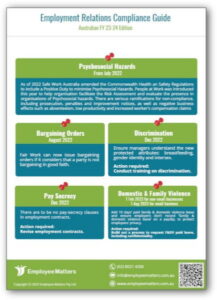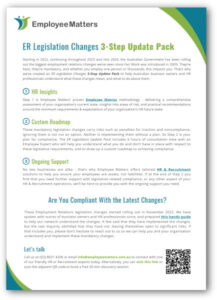A recent article circulating in HR news highlights the pitfalls of inadequate workplace training. The story centred on a company that believed it had taken the necessary steps to protect itself but faced unexpected consequences when Fair Work Australia ruled against it. What happened? An employer terminated an employee for what it deemed “totally unacceptable” behaviour, citing breaches of four workplace policies. However, Fair Work Australia ruled that the dismissal was harsh due to insufficient training, finding that the company’s ‘tick-and-flick’ approach failed to meet compliance standards. The result? Substantial compensation awarded to the employee.
Key Takeaways for Employers
Although the company had policies and training in place, it wasn’t enough to avoid an adverse judgement. The Fair Work Commission emphasised that relying on “commonsense” as a basis for employee behaviour is not enough. Employers must ensure that proper training is in place to guide conduct, particularly when it involves serious policies around workplace behaviour, discrimination, and harassment. The Commission stated that training quality and intent, whether it educates meaningfully rather than just ticking a box, play a crucial role in determining fairness in cases of employee misconduct.
The ruling underscores that employers cannot assume that commonsense alone will guide employees to appropriate conduct. Instead, they must prioritise comprehensive training that actively engages employees and clarifies expectations.
How Do I Ensure That This Does Not Happen In My Organisation?
Building a strong brand takes years, yet a single high-profile case like this one can cause lasting damage. The recent ruling underscores the critical importance of thorough and effective workplace training. Simply going through the motions is not enough; robust training and well-communicated policies are essential to prevent costly and damaging outcomes.
In this case, Fair Work Australia highlighted that training needs to go beyond compliance checklists. Effective training, particularly on policies around discrimination, harassment, and workplace conduct, must be impactful and comprehensive. As Deputy President O’Keeffe noted, while “simple life experience” should ideally guide employees, structured policy training is vital to bridge knowledge gaps and prevent misunderstandings.
To protect your brand and ensure compliance, employers should take proactive measures to ensure training is meaningful, measurable, and engaging. Here are some best practices:
- Interactive Training Sessions: Use role-playing, scenarios, and group discussions to create engaging sessions that help employees internalise and remember essential information.
- Regular Refresher Training: Revisit key policies periodically to keep employees informed and compliant with any updates, ensuring a steady reinforcement of workplace standards.
- Knowledge Assessments: Follow up on training sessions with assessments to gauge employee understanding, identify any knowledge gaps, and confirm that employees fully comprehend critical policies.
- Clear, Accessible Policies: Ensure that policies are written in clear, straightforward language and are easy for employees to access. Consider using a central HR Information System (HRIS) to house policies and training resources, making it simple for employees to reference them as needed.
A $33k Reminder for Employers
The $33,000 penalty against the employer serves as a costly lesson in the importance of training. In today’s compliance-focused environment, companies must prioritise building an informed and educated workforce through comprehensive, meaningful training that goes beyond mere box-ticking.
Need Help or Just Not Sure Where to Start?
Employee Matters can help with developing and delivering comprehensive policies and training for your workforce to help you navigate and avoid issues and fines such as this one. Our team works daily with clients nationwide on legislation compliance, appropriate workplace behaviour training and the new psychosocial hazards framework, so there is not much we have not seen or know how to mitigate. Book a free discovery session with us now to discuss your unique situation with an experienced member of the Employee Matters team.
Contact us now to discuss your unique situation with an experienced member of the Employee Matters team.
Alternatively, you can reach us at:
- Email: info@employeematters.com.au
- Phone: (02) 8021 4206
Employee Relations Legislation Changes Hub
There is a significant amount of mandatory Employment Relations legislative change that impacts you and every other business in Australia now. Our resource hub is designed to help you understand these wide-ranging changes.

3-STEP UPDATE PACK
Take the first step to be compliant. Our 3-Step Update Pack helps Australian business owners and HR professionals understand what these new ER legislation changes mean and what to do about them.
Step 1 - HR Insights
Step 2 - Custom Roadmap
Step 3 - Ongoing Support

Need HR/Recruitment Support?
Call (02) 8021 4206 or email info@employeematters.com.au to discuss your HR, Recruitment or ER Legislation challenges with an experienced member of the Employee Matters team.
Alternatively, you can book a free call by completing the adjacent form:
